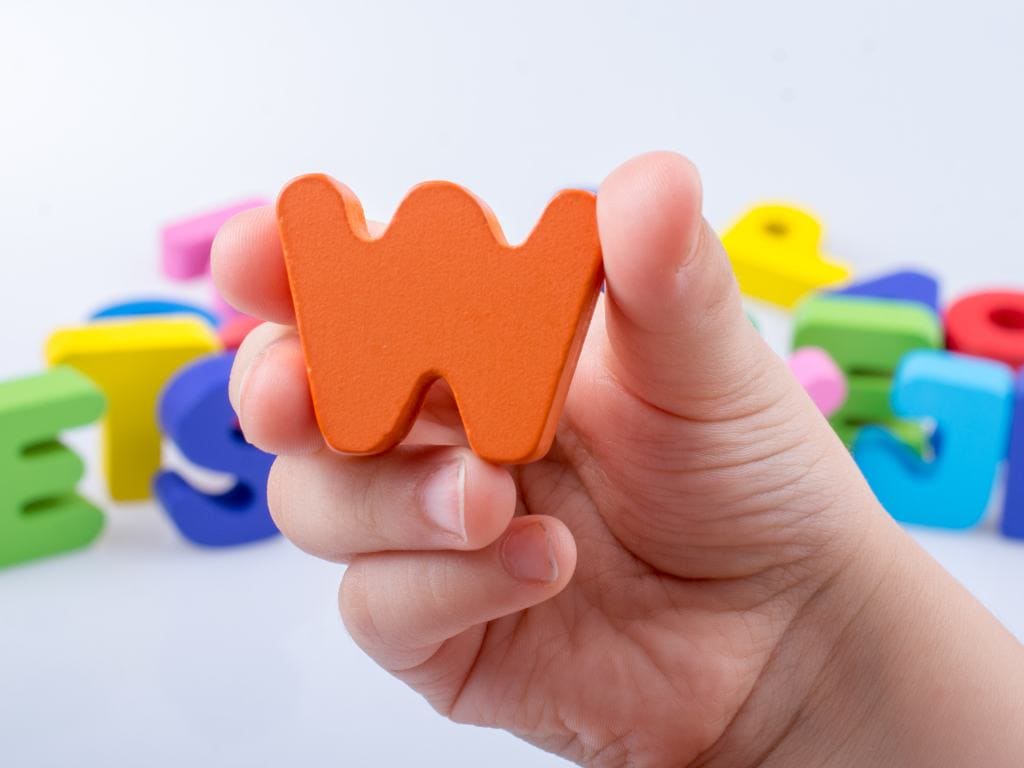100+ Spanish Words That Start With W (& Words Containing W)
What words start with W in Spanish? Learn 100+ W words in Spanish!
If you’re studying Spanish, you’ve probably realized that there are only a few words in the Spanish language that start with the letter w.
As a former Spanish Teacher, I was often asked why by my former students. The reason is rather simple. However, if you’re a language-lover like me, you’ll enjoy digging into the intricacies behind it. In fact, I spent several weeks researching in both Spanish and English online, visiting my local library, and consulting the Royal Spanish Academy to find out.
Whether you’re studying for a Spanish test, preparing to move to a Spanish-speaking country, or simply curious about the Spanish language, this post is for you!
We’ll go over everything you need to know about the letter w in Spanish including over 100 words that begin with w in Spanish and their English translations, why there are so few words beginning with w, w pronunciation in Spanish, and more.
Are there any Spanish words that start with W?
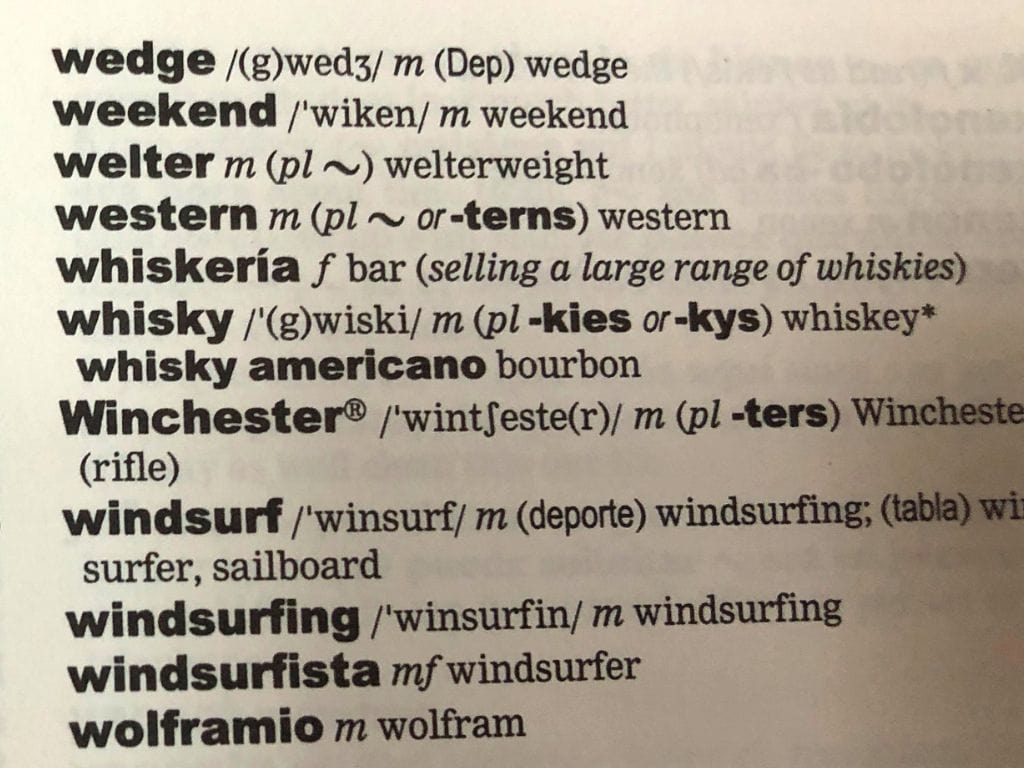
To begin with, yes, the letter W exists in the Spanish language. W is the 24th letter in the Spanish alphabet (of 27 letters).
That being said, there are very few words that start with W in Spanish.
This is because the letter W was not traditionally a part of the Latin language, from which Spanish is derived.
The letter W is thus used in Spanish primarily for words originating from other languages—which makes them easier to learn!
These Spanish “loanwords” or “borrowed words” are called extranjerismos.
More loanwords are being adopted into the Spanish language all the time. The more recent additions to Spanish W words are especially noticeable in words related to technology.
For example, web and wifi are borrowed from English!
But, who decides to adopt new words into the Spanish language? That would be the Real Academia Española (RAE). Founded in 1713, the institution (called Royal Spanish Academy in English) is in charge of safeguarding the correct use of the Spanish language.
According to RAE, there are just 34 words that officially start with W in Spanish!
However, there are many more words with W in Spanish that are commonly used, so we’ll include them in this list of words that start with W in Spanish, too.
Top 20+ Spanish Words that Start with W
What are some words in Spanish that begin with a W? Scroll down to see 20+ of the most common Spanish words starting with a W. You’ll also find examples of each W Spanish word used in a sentence.
By the way, the majority of this list are the W words in Spanish verified by the Real Academia Española (Spanish Royal Academy).
1. Whisky – Whisky
🗣 wees-key

A Spanish word that begins with W is whisky.
Whisky is the same as the English word whisky or whiskey. (The word is spelled with or without an “e” depending on where it’s made.) Whisky is a distilled spirit made from fermented grain.
The English and Spanish pronunciation of whisky is almost the same. In fact, the RAE suggests that you pronounce it in English.
—¿Podría traerme un whisky, por favor?
—Could I get a whiskey, please?
Depending on where you are in the Spanish-speaking world, you might see the spellings wiski or güisqui to refer to the popular alcoholic drink.
A specialty bar that only serves whisky would be called a whiskería. (Exercise caution if going out, however, because this is also the word for a spicy club in Latin America and Spain.)
There are several types of popular whiskeys. In Spanish, you’d simply add a modifying word to “whisky” to describe which drink you’d like.
Here are some examples:
- whisky de malta – malt whisky
- whisky escocés – Scotch whisky
- whisky americano – bourbon
—¡Este whisky escocés es delicioso! ¿Que marca es?
—This scotch whisky is delicious! What brand is it?
2. WiFi – WiFi
🗣 wahee-fay or wee-fee
WiFi is a loaned word from the English language—making it an easy W word to remember!
You might see it written el wifi, la wifi, wi fi, Wi-Fi, or WiFi. The capitalized version refers to the trademarked version, but as I’m sure you know they are more or less used interchangeably.
—Necesito encontrar un punto de acceso Wi-Fi para revisar mis correos electrónicos mientras estoy fuera.
—I need to find a Wi-Fi hotspot to check my emails while I’m out.
—Puedo conectarme a wifi para transmitir mis programas favorites.
—I can connect to wifi to stream my favorite shows.
3. WWW – WWW
🗣 doh-blay-veh, doh-blay-veh, doh-blay-veh

While WWW is not technically a word, it’s essential to know if you’re trying to communicate in Spanish.
If you’re asking someone for their website, for example. They might say “uve doble, uve doble, uve doble” or “tres uves dobles.”
Regarding the World Wide Web, the noun la malla mundial is used. W3 is also sometimes written or heard.
—La URL de todos los sitios web comienza con “www”.
—The URL for all websites starts with “www.”
—La malla mundial ha revolucionado la forma en que accedemos y compartimos información.
—The World Wide Web has revolutionized how we access and share information
4. La or El Web – Web
🗣 lah-wehb, el-wehb
The word web is used in Spanish and is borrowed from English.
Web is the same as the English word “web” or “internet.” (Internet is “la red” in Spanish.)
If referring to the web in general, use la web.
If abbreviating the World Wide Web, use el Web.
—A menudo utilizo varios motores de búsqueda para explorar la información disponible en la web.
—I often use multiple search engines to explore the information available on the web.
—¿Sabías que a Tim Berners-Lee se le atribuye la invención del Web?
—Did you know Tim Berners-Lee is credited with inventing the Web?
The RAE also recognizes the use of web in these compound words:
- página web – webpage
- seminario web – webinar
- sitio web – website
5. Webinario – Webinar
🗣 we-bee-narr-e-oh
Adapted from the English word for webinar, webinario is now officially listed as a Spanish word that starts with W by the Real Academia Española.
Also called a seminario web, the word webinario is a mix between web (web) and seminario (seminar).
Both webinario and seminario web are masculine nouns.
—Tengo muchas ganas de asistir al webinario mañana para conocer las últimas estrategias de marketing digital.
—I’m looking forward to attending the webinar tomorrow to learn about the latest digital marketing strategies.
Just in case you don’t know what a webinar is, it’s an online presentation in which participants can join, watch, and participate from their personal devices.
6. Wéstern – Western (movie)
🗣 wes-tearn
A wéstern is an obvious loanword from English to describe a Western movie.
Westerns are films or TV shows that feature cowboys, gunslingers, and bounty hunters in the American West. They are set in the late 19th Century.
—¿Que tipo de películas te gustan? Mis películas favoritas son los westerns.
—What kind of movies do you like? My favorite movies are westerns.
La película del oeste or película de vaqueros might be used in some countries over western. The English meaning are western movie or cowboy movie, respectively.
7. Windsurf, Windsurfing – Windsurfing
🗣 ueeend-soorf, ueeend-soor-feeeng

Windsurf is a water sport where people ride a surfboard with a sail and use wind power to navigate and glide across the water. Windsurfing is very popular in Tarifa, Spain where the winds are just right for this type of activity.
Windsurf and windsurfing refer to the same word in English: windsurfing. You can pronounce it just like you would in English.
—Estoy emocionado de ir a la playa este fin de semana para probar el windsurf por primera vez.
—I’m excited to hit the beach this weekend to try windsurfing for the first time.
The Spanish noun windsurfista is a person who does windsurfing. In other words, windsurfista is windsurfer in English.
—El windsurfista cabalgó sin esfuerzo sobre las olas, maniobrando hábilmente la vela y la tabla.
—The windsurfer effortlessly rode the waves, skillfully maneuvering the sail and board.
8. Waterpolo – Water Polo
🗣 uah-tear-poh-low

Water polo is a sport played in a swimming pool where players score goals by passing the ball to each other down the length of the pool in an attempt to score a goal.
Waterpolo is almost the same word in English: water polo.
In some countries, they use the term polo acuático instead. The spelling water-polo is also seen.
—El partido de waterpolo se hizo cada vez más intenso mientras ambos equipos luchaban por marcar el gol de la victoria.
—The water polo match became increasingly intense as both teams battled to score the winning goal.
The ending “ista” in Spanish refers to a person. For example, a dentista (dentist), periodista (journalist), or artista (artist).
Thus, someone who plays water polo is called a waterpolista. Waterpolista means water polo player in English.
—El waterpolista mostró notable agilidad.
—The water polo player displayed remarkable agility.
9. Wolframio – Tungsten
🗣 bol-frah-me-oh
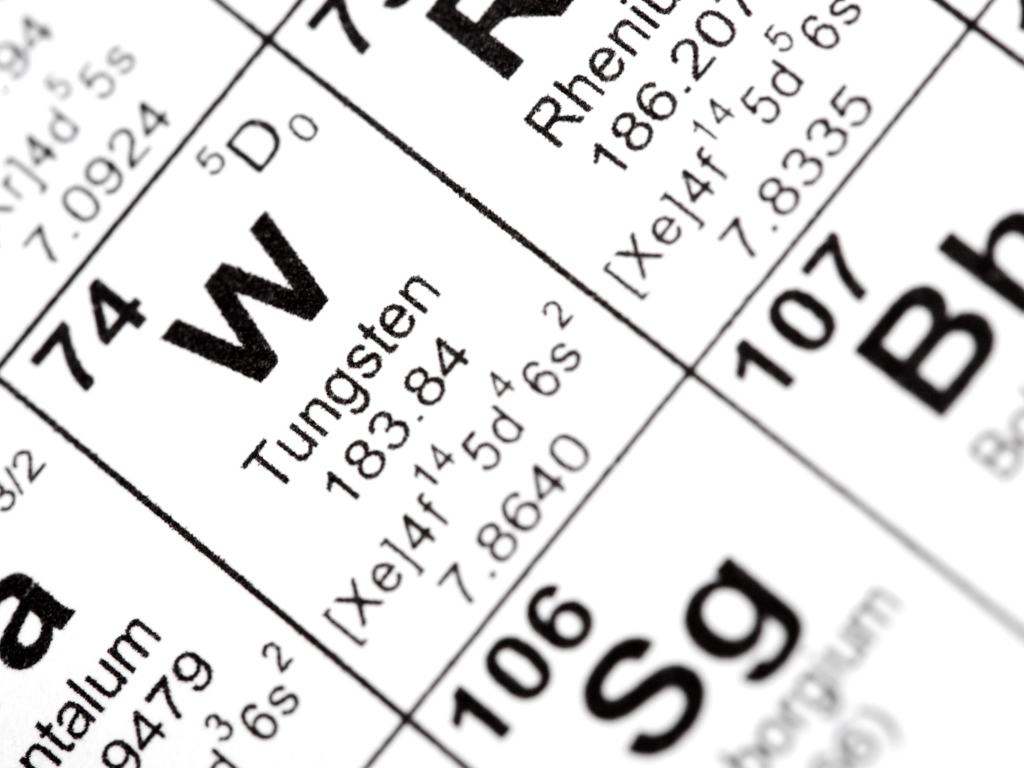
Wolframio is “tungsten” in English. Tungsten is a naturally-occurring rare metal often used as electrodes, heating elements, or filaments in lightbulbs.
The chemical symbol for tungsten on the periodic table is actually W! This is because tungsten is also called wolfram, a name derived from German.
—El wolframio se utiliza en los filamentos de las bombillas porque puede soportar temperaturas muy altas sin derretirse.
—Tungsten is used in lightbulb filaments because it can handle very high temperatures without melting.
This W word is also called wólfram or tungsteno in Spanish.
10. Watt – Watt
🗣 oooh-aht
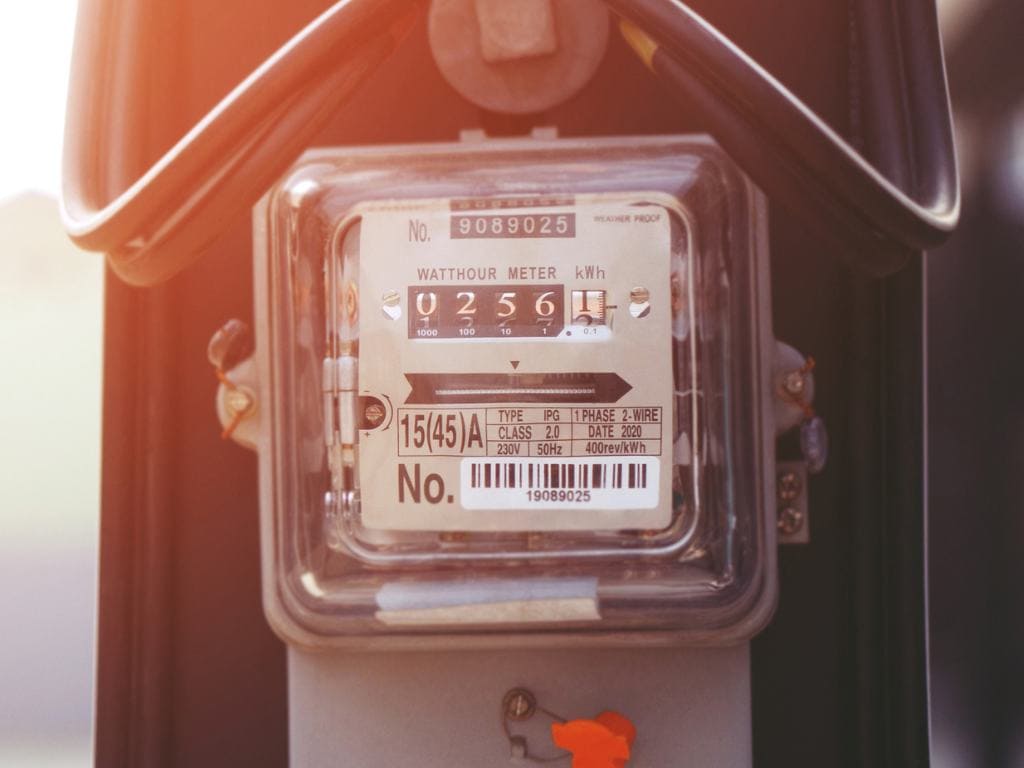
Watt, the unit of measurement that quantifies the rate of energy transfer or power consumption, has several different names in Spanish.
Watt is officially recognized as a word since it comes from the name of the Scottish inventor James Watt (1736-1819).
The Spanish word vatio also means watt. However, the spelling wat is often used as are the abbreviations W. and Wh. Wh. refers to watts per hour. Wataje is wattage.
—La bombilla de mi lámpara consume solo 10 wats de electricidad. ¡Es una opción energéticamente efficient!
—The lightbulb in my lamp consumes only 10 watts of electricity. It’s an energy-efficient choice!
11. Wok – Wok
🗣 ooohahkk
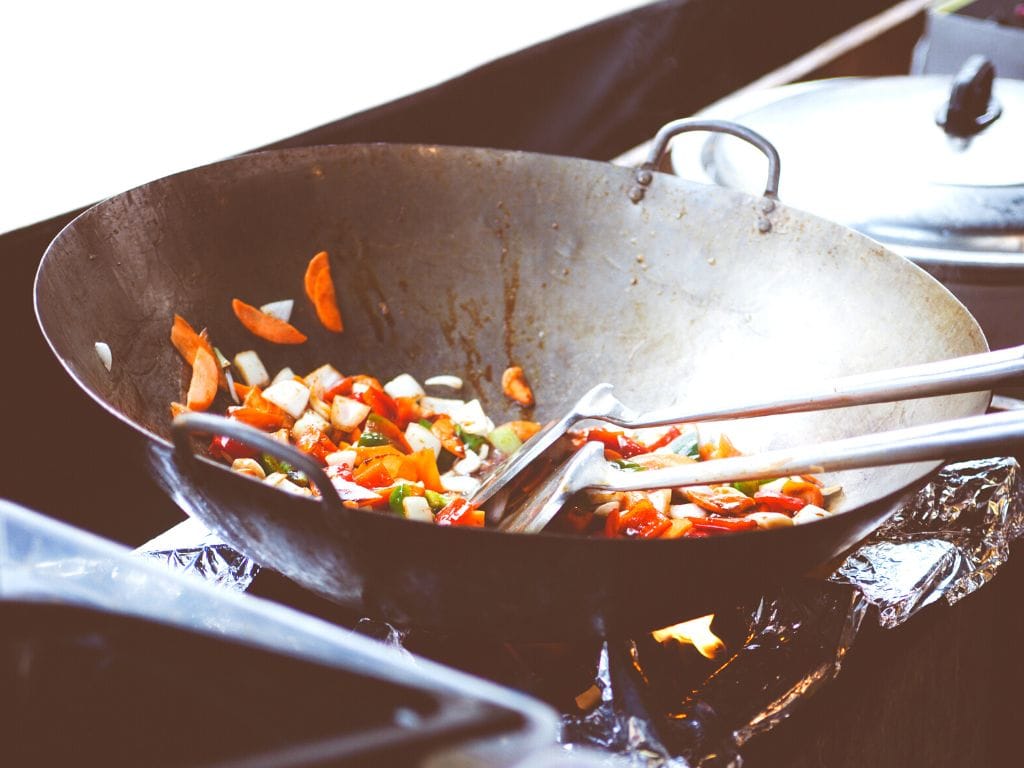
The W word wok in Spanish represents the versatile metal pan with a wide, rounded bottom and high, angled sides.
Originating from the Cantonese word wok (鑊), the shape of the wok makes it easy to toss and stir ingredients while maintaining even heat distribution.
We use the same word in English as in Spanish for this pan: wok.
El wok is a masculine noun in Spanish.
—Ella arrojó hábilmente las verduras en el wok chisporroteante, infundiéndolas con los ricos sabores de la salsa salteada.
—She skillfully tossed the vegetables in the sizzling wok, infusing them with the rich flavors of the stir-fry sauce.
By the way, do you want to know how to say delicious in Spanish? Find out how.
12. Wantán – Wonton
🗣 ooohahn-tahn

Wantán, or wonton as we call them in English, is a dumpling that originated in China. Wontons are typically filled with minced meat or vegetables.
Wontons must have been very popular at one point to warrant being added to the official dictionary by the RAE! At least in Chile, Ecuador, El Salvador, Guatemala, Nicaragua, and Perú, where the term seems to be used most often.
Wantán in Spanish comes from the Cantonese word wan tang.
—Pedí un tazón de deliciosa sopa wonton.
—I ordered a bowl of delicious wonton soup.
13. Wafle – Waffle

🗣 ooohah-flay
Waffles, the popular breakfast food with a grid-like texture, lend their name to Spanish. Spanish for waffle is wafle or waffle (Both W words are masculine nouns.).
The W word wafle is especially heard in Latin America. In Spain, on the other hand, waffles are called gofres. Whether you call them wafles or gofres, this word beginning with W in Spanish is delicious!
—Me encanta comenzar mis fines de semana con wafles cubiertos con bayas frescas y jarabe de race.
—I love to start my weekends with waffles topped with fresh berries and maple syrup.
Waflera is a Spanish W word referring to a waffle maker or waffle iron. While many of us pop pre-made frozen waffles into the toaster, you can actually make them using a waffle iron!
—Estoy planeando hacer wafles caseros esta mañana con mi nueva waflera.
—I’m planning to make homemade waffles this morning using my new waffle maker.
14. Walkie-Talkie – Walkie-Talkie
🗣 wahl-key tall-key
Walkie-Talkie is a loanword from English for a Walkie-Talkie, the portable radio transmitter device invented almost 100 years ago!
Security guards, construction workers, event organizers, law enforcement officers, emergency responders, and warehouse staff often use walkie-talkies on the job.
Walkie-talkie should be pronounced just like it is in English per the RAE.
The device is sometimes spelled walki-talki in some Spanish-speaking countries.
—Durante nuestro viaje de campamento, usamos un walkie-talkie para mantenernos conectados en la naturaleza.
—During our camping trip, we used a walkie-talkie to stay connected in the wilderness.
15. Walkman – Walkman
🗣 wahlk-mon
Walkmans were once so popular that they were adopted by the RAE. These were portable cassette players that revolutionized personal music listening in the 1980s. They were made by Sony.
Later, Sony made personal CD players called Discman that you listened to with headphones, too.
Walkman is the brand which is also the name of the device. Spanish speakers use the same word as in English: Walkman.
—Cuando era más joven, me encantaba usar mi Walkman para escuchar música mientras estaba fuera de casa.
—When I was younger, I loved using my Walkman to listen to music while I was out and about.
16. Wáter, WC – Bathroom
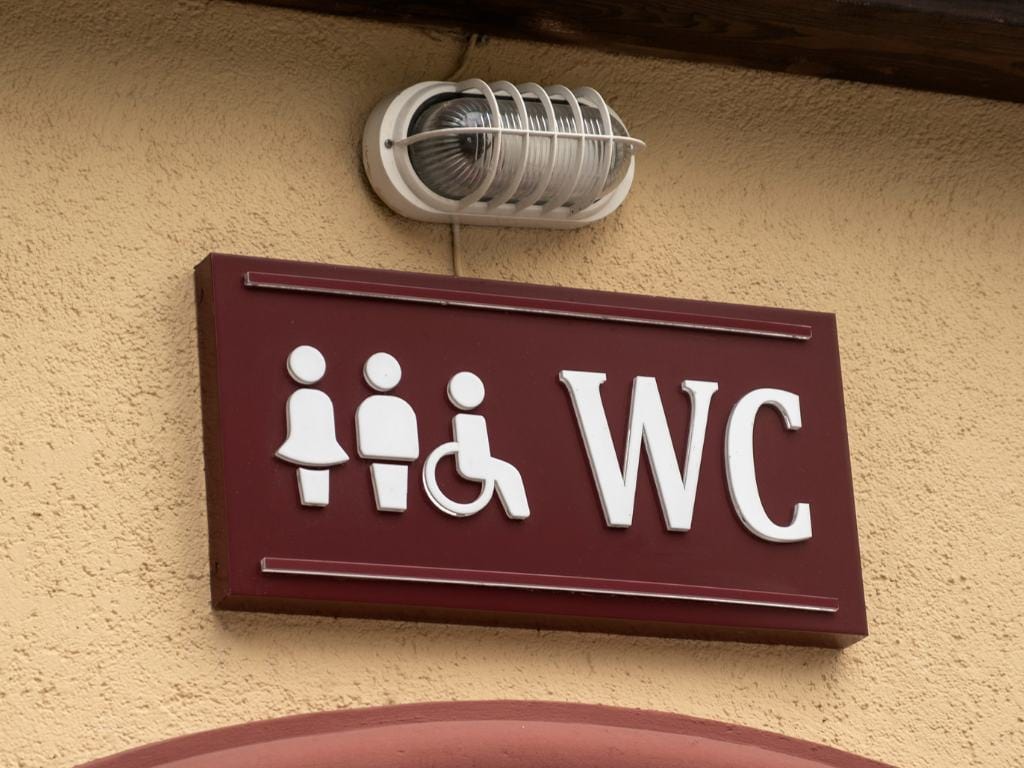
🗣 bah-tear
A word you’ll hear in Spanish beginning with a w is wáter or it’s variants watercloset or WC.
The English equivalent is water closet.
But, what is a water closet? Water closet is a word originating in British English to refer to what Americans call a bathroom or restroom.
Around the world, including in some Spanish-speaking countries, you’ll find public restrooms marked with “WC.”
If you hear Spanish speakers say the word wáter, they’re referring to the bathroom as a shortened form of a water closet. Or, they might be referring to the actual toilet (also inodoro or retrete).
The spelling váter may also be used in Spain.
—Ahora vuelvo; Necesito usar el wáter antes de que nos vayamos.
—I’ll be right back; I need to use the water closet before we leave.
—¿Podría indicarme el WC más cercano?
—Could you point me to the nearest WC?
Expert Tip: You may also see (or hear) bathrooms referred to as servicios or aseos or even sanitarios—depending on the country. So contrary to what you learned in Spanish class, ¿Dónde está el baño? is not the only way to ask where the restroom is!
17. Washingtoniano – Washingtonian
🗣 wah-sheeng-tone-eee-ah-noh
Washingtoniano means Washingtonian and refers to people from Washington, D.C. the United States capital. Washingtoniana refers to feminine nouns or people.
Washingtonian can also describe something from or relating to Washington.
Interestingly, the RAE lists washingtoniano as an official Spanish W starting with W. We wonder why, do you?
—El político de Washington era conocido por su fuerte defensa de la conservación del medio ambient.
—The Washingtonian politician was known for his strong advocacy for environmental conservation.
18. Wachimán – Watchman
🗣 oooahh-chee-mawn
Wachimán is a word that starts with W in Spanish.
Also spelled guachimán, it means watchman in English. This word for a watchman, or a security guard as we often say in English, is used often to describe the occupation in Latin America.
Watchmen look over the grounds and often welcome people at the reception of a building.
—El wachimán patrullando el recinto durante toda la noche.
—The watchman patrolling the premises throughout the night.
19. Wikipedista – Wikipedia Editor
🗣 wee-key-pae-dee-stah
Wikipedia gives us several words with W in Spanish that we can use!
Wikipedia is the free online encyclopedia that allows users to collaboratively create, edit, and update articles on a wide range of topics.
Since Wikipedia has become a part of the English vernacular, it’s not surprising that the RAE adopted a few Wiki-esque words to the language.
The three official RAE words that relate to Wikipedia are wikipediano, wikipediana, and wikipedista. These W words are used to describe someone who knows Wikipedia well, like an editor or superuser.
Be that as it may, Wikcionarios, wiki, wikificar, and Wikinoticias are used in Spanish as well.
—El editor de Wikipedia hizo referencia a la información para garantizar la precisión del artículo antes de su publicación.
—The Wikipedia editor referenced information to ensure the accuracy of the article before it was published.
At least if you’re looking for some beginner Spanish words, these Wikipedia variants will be easy to learn!
20. Wasapear – To Whatsapp
🗣 wah-sau-pay-arr
With the growing popularity of the WhatsApp program, the words WhatsApp, wasapear, wasap seem to have become commonplace.
Clearly, WhatsApp is the same word as in English as its the proper name of the communication app. Wasap is a variant.
Wasapear is being used a verb “to Whataspp “someone)”. (This is much like how we now use “to Google” as a verb.) Alternative spellings guasapear and whatsappear have also been recorded.
The present tense verb conjugations of wasapear would be:
- yo – wasapeo
- tú – wasapeas
- Ud./él/ella – wasapea
- nosotros, -as – wasapeamos
- vosotros, -as – wasapeáis
- Uds./ellos/ellas – wasapean
—I’ll WhatsApp you the details of the meeting once I have them confirmed.
—Te wasapeo los detalles de la reunión una vez que los tenga confirmados.
🖨 Looking for a PDF printout? Get the Spanish W Words Cheatsheet now!
How to Say W in Spanish
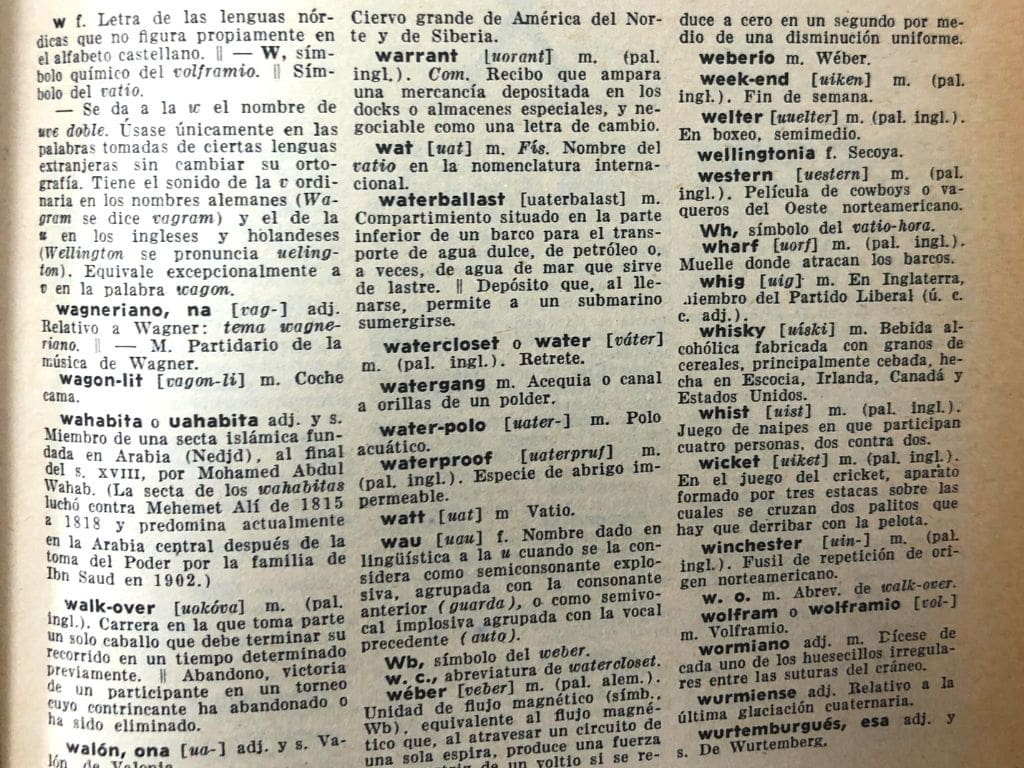
So, how do you say the letter W in Spanish? According to the RAE, the letter W in Spanish is called uve doble.
However, just so many Spanish words, there are variants to the Spanish letter W.
In America, you may hear W called ve doble or doble ve.
In Mexico, Central America, and the Caribbean, doble u (like the English “double u”) is the preferred way to say in Spanish, W. (This is how I learned it growing up on the Texas/Mexico border.)
Even less frequently, you might hear doble uve.
Letters are feminine in Spanish. So, if saying the letter, you’d say la uve doble or la letra uva doble.
If for some reason you need to say Ws (plural) you may do so. The plurals of the above are uves dobles, ves dobles, dobles ves, dobles úes or dobles uves.
Letter W Pronunciation in Spanish
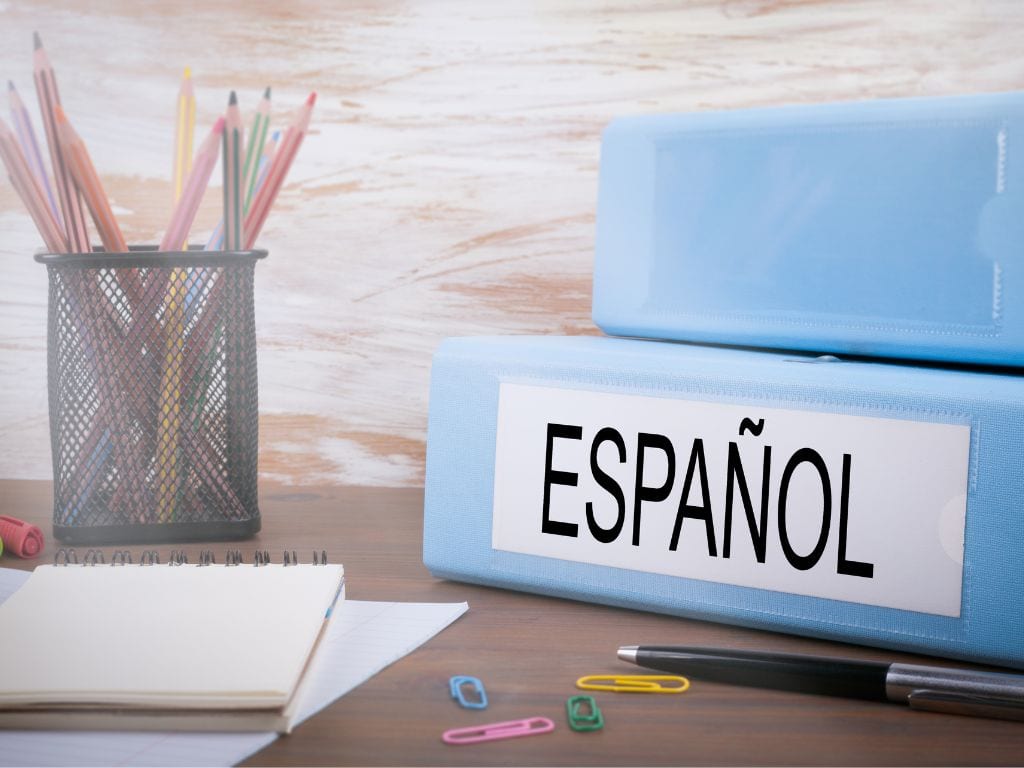
Since the W is not traditionally considered a part of the Spanish alphabet, words beginning with W in Spanish typically come from other languages. Oftentimes, the origin is Germanic: English or German. But, some Spanish W words come from other languages.
The RAE says that the Spanish letter W is most often pronounced like the letter B in English or GU. There are also times when the W retains its W sound, or can sound like a V.
Let’s review the W pronunciation in Spanish:
1. When the Letter “W” Sounds Like “B” in Spanish
Oftentimes, the Spanish letter W sounds like a B. (For those phonetics geeks like me, this is the voiced bilabial phoneme /b/ like butter).
The W is pronounced as /b/ in proper names of Visigothic origin like Wamba (bámba) and Witiza (bitísa). It’s also pronounced as a /b/ in German-origin words such as wolfram (bolframio]) and wagneriano (bagneriáno). Place names of other European languages, such as Polish or Dutch also take the /b/ pronunciation.
2. When the Letter “W” Sounds Like “GU” in Spanish
If the letter W comes together with several vowels to produce one sound (a dipthong), it makes a /gu/ sound.
The g in the /gu/ sounds very similar to the English g in glove. The u sounds like oooh. So, the letters gu before the vowels a, e, i, and o make these sounds: gua, gue, gui, guo.
You’ll hear the /gu/ pronunciation of W in Spanish in most English words in Spanish: sandwich (sánduich or sánguich), water polo (guaterpólo), web (guéb). English words with the W at the beginning of the word also typically take the /gu/ sound: guachimán (watchman) or güisqui (whisky).
The same goes for words and names from Asian, Semitic, and some indigenous languages. For example, kiwi (kígui), taekwondo (taekuóndo), or wow/wao (wow).
If the W comes in contact with the sound /u/ (U is like like oooh in English), the W often pronounced as /b/: Kuwait (kubait]) or Hollywood (jolibud).
3. When the Letter “W” Sounds Like “W” in Spanish
For some words beginning with W in Spanish, the RAE actually suggests pronouncing them like they are in English, which would maintain the W sounds! For example: walkie-talkie or whisky.
4. When the Letter “W” Sounds Like “V” in Spanish
In German proper names, W can be pronounced like it is in German as an English V. (This is the labiodental articulation [v] like vacation). However, since the [v] sound is not a part of the Spanish phonological system, most speakers use the /b/ sound: Wagner (bágner) or Weimar (béimar) anyway.
As you can see, answering the question, “How do you pronounce W in Spanish?” is quite complicated! As a Spanish learner, do your best to follow the guidelines! But, you don’t have to have perfect pronunciation by any means!
80+ More W Words in Spanish
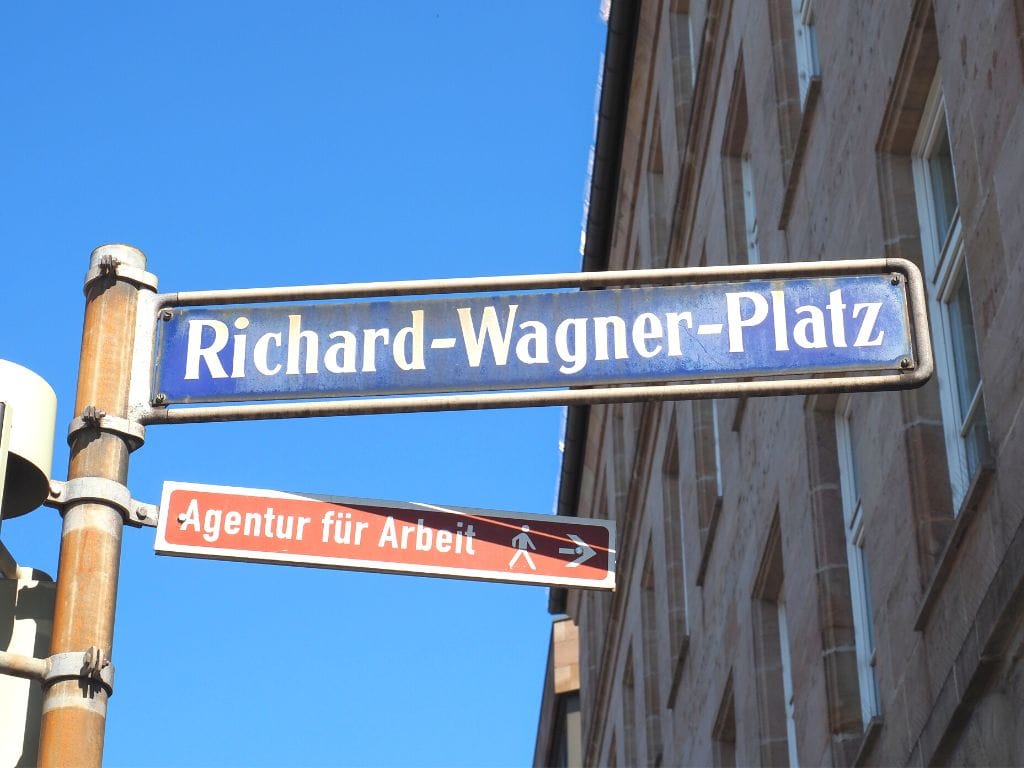
While most of the list of W Spanish words below aren’t included in the RAE’s dictionary, these are W words that are used in Spanish.
In order to provide you with the most thorough and accurate list of Spanish W words, we searched through the RAE’s list, Spanish dictionaries, Spanish-English dictionaries, online dictionaries, and foreign language forums.
Plus, we bring our own experience growing up on the US/Mexico border, being a Spanish Teacher with a Master’s Degree in Spanish, and living in a Spanish-speaking country!
With this in mind, here are over 80 more W words in Spanish:
- wachar – Mexican/American slang for to look at, to see
- ¡Wepa! – a positive Spanish words meaning Cool! Oh yeah! (Caribbean slang) and also another form of greeting or amazement in several Latin American countries
- Waal – Waal (Dutch river)
- wafer – thin cookie
- wagneriano, wagneriana – Wagnerian, related to Richard Wagner’s works and music and also a term for an admirer or enthusiast of his works
- wagnerismo – Wagnerism, Composer Richard Wagner’s philosophical and artistic ideals
- Wagogo – African arrow poison
- wagon-lit – sleeping car on a railway
- wagon, el vagón – railcar
- Wahabismo, wahabí, wahabita – connected to Wahhabism (in the RAE), also uahabita
- Wakayama – Wakayama
- wakeboarding, hacer la tablaestela – wakeboarding, the water sport
- walabí, ualabí – wallaby (animal)
- Walhalla – Walhalla (city in South Carolina, USA)
- walk-over, walkover, w.o. – forfeit
- Wall Street – Wall Street (location)
- Wallace – Wallace
- Wallpaper, el papel pintado – wallpaper
- Walon – Walloon, an ethnic group from Wallonia region
- walquiria, walkiria, valquiria – mythological Valkyrie
- Walter – the name Walter is also Gutierre or Gualterio in Spanish
- wamba – a type of sneaker
- Wanda – the woman’s name Wanda
- ¡Wao! – Sometimes used to say Wow! Also spelled ¡Guao! or ¡Wow!
- WAP – WAP, an abbreviation for Wireless Application Protocol
- wapiti – A Wapití or elk is a species of deer
- warrant – a certificate for acquiring shares at a fixed price and period
- wasabi – spicy wasabi of Japanese cooking
- Washington – Washington (location)
- wasp – WASP (White Anglo-Saxon Protestant)
- waterballast – water ballast, water in a special compartment of sailboat
- Watergang – Watergang, the village in the Netherlands
- wau – variant of the phoneme /u/ in a diphthong
- webcam, la cámara web – webcam
- Weber, Wb., weberio – A weber (Wb) is the magnetic flux unit in physics
- weblog – web blog
- webmaster, el administrador de web, la administradora de web – webmaster (occupation)
- webquest – web search activity
- wedge – you may hear wedge used in reference to golf or wedge heels
- weimarés, weimaresa – Weimarian, characteristic of Weimar, Germany
- Wellington – trademarked name for Wellington rainboots (las botas de lluvia)
- wellingtonia – Wellingtonian, giant redwood or sequioa tree (also velintonia)
- wélter – A wélter or welterweight is an intermediate rank in boxing
- welter – confusion
- welwitschia – Welwitschia (plant)
- wengué – wenge, a dark-colored woord fo the Millettia laurentii plant
- weón, huevón – Chilean slang for a lazy person, abbreviated in text messages as wn
- westfaliano, westfaliana – Westphalian, related to Germany’s state
- wey – Mexican slang for dude, guy (usually spelled guey)
- wharf, muelle, embarcadero – wharf
- Whig – Whig, a political liberal from the 17th and 18th centuries or a liberal
- Whist – Whist card game
- Whopper – Burger from Whataburger fast food chain
- wicket – in cricket refers to stumps, bails, pitch and batsman’s dismissal
- widget – widget (tech)
- wigwam – wigwam
- wikén – weekend (Chilean slang), also week-end or weekend
- William, Willy – the name Wiliiam in Spanish is Guillermo, and the nickname Willy are also Guille, Memo, or Guillo
- wincha – hair tie or measuring tape
- winche, el cabrestante – winch, the mechanical device to adjust the tension of a rope
- Winchester – Winchester firearm
- Windows – Windows computer Operating System
- Winnipeg – Winnipeg (location in Canada)
- wireless, inalámbrico, sin cables – wireless (tech)
- wonderbra – padded bra trademarked by Wonderbra
- woofer, subwoofer – speakers
- WordReference – WordReference is a popular Spanish/English dictionary website
- workaholic – workaholic, someone who works too much
- workshop, el taller – workshop
- wormiano – Wormian, irregular bones of the skul
- wrap – sometimes used in Latin American for a wrap sandwich
- wrestling, wrestlemania – wrestling (sport), also WWE and other abbreviations
- wurmiense – refers to a glacial period
- wurtemburgués, wurtemburguesa – From Wurtenburg
- Wyoming – Wyoming, a state in the USA
- wysiwyg – WYSIWYG editing software
Words With W in Spanish

If you’re playing Scrabble with Spanish speakers, you might want to find some Spanish words with W in the middle or at the end. Well, you’re in luck!
Here are some basic Spanish words containing W:
- bungalow
- clown
- darwiniano
- darwinismo
- darwinista
- down
- Halloween
- hardware
- hawái
- hawaiano
- kiwi
- Kuwait
- kuwaití
- lawrencio
- malawiano
- maxwell
- neodarwinismo
- Newton
- newtoniano
- rawsense
- sándwich
- sawali
- show
- software
- taekwondo
- Taiwán
- taiwanés
- tawahka
- Twahka
H Words in Spanish That Are Confused W Spanish Words

Spanish has some words that Spanish learners sometimes think are spelled with W. The most common of these is probably huevo, which means egg. People often think it’s spelled “wevo!”
These confusing words usually begin with an HU instead of a W. Since the H is more or less silent in Spanish, these words start with the oooh sound of the letter u. Followed by the vowels a, e, or i, they can definitely sound very close to a W in English!
Here are some words in Spanish that people sometimes think are spelled with W:
- hueco – hole
- huelga – strike
- huella – footprint
- huerto – orchard
- hueso – bone
- huevo – egg
- huérfano – orphan
- huésped – guest
- huitlacoche – a delicacy made from corn fungus
- huarache – specialty Mexican sandal
W in Spanish: FAQs
How can I find Spanish words that begin with W?
To find W alphabet words in Spanish, look in Spanish dictionaries, online Spanish-English dictionaries like WordReference.com or Spanishdict.com, or consult the RAE. We used all of these methods and more to make our list, so you can also just consult our W words in Spanish list!
Why are some words spelled with W and V in Spanish?
In some Spanish words, the W was been replaced by V as they were adapted into the Spanish language. For example, wagon (vagón), waltz (vals), and watt (vatio). Some others have varied spellings or variants: wolframio/volframio or wellingtonia/velintonia.
What are some Spanish words that start with K?
There are only about 50 words in Spanish that begin with the letter K! Most of these are borrowed from other languages. Some Spanish K words you probably recognize are: kaki, kebab, kéfir, kelvin, kilo, koala, and kungfú.
How do you spell “eggs” in Spanish?
To say eggs in Spanish, you say huevo. The proper Spanish spelling is h-u-e-v-o although it’s often mispelled as w-e-v-o.
What are some French words beginning with W?
Just like in Spanish, there are a only few words French words that start with W! Most of these are borrowed from languages like German or English. And, some of them are the same words you’ll find on the W words list in Spanish! Some French W words are: wagon, watt, web, webmestre, webcam, week-end, wifi, wok, wombat, and wurm.
W Words in Spanish Printable PDF
Looking for a list of Spanish W words you can print? Get our full list of words that start with the letter W in Spanish in a convenient PDF format for just $5! This download includes two lists— one of commonly-used W words and the other with official RAE words only!

Conclusion: Spanish Words that Begin with W
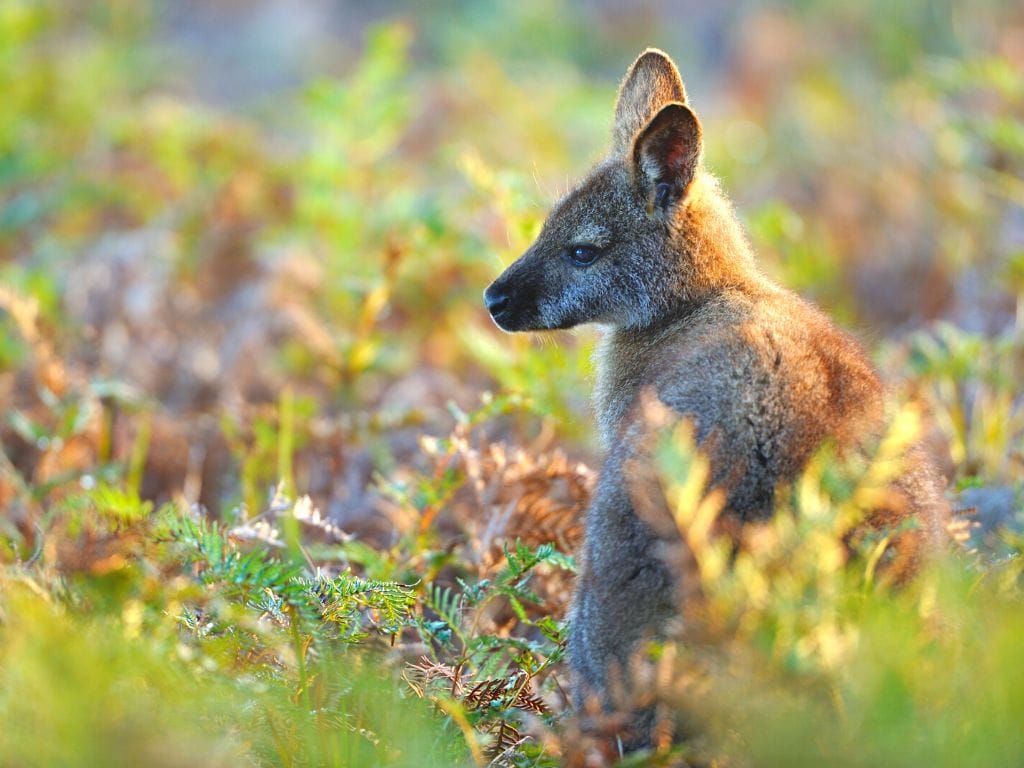
If you came to this blog looking for a word in Spanish that starts with W, we hope this list of W words in Spanish helps you! After all, there are over 100 W words listed!
With only a few W words in Spanish, you’ll learn them in no time—just in time for your next trip to a Spanish-speaking country.
Feel free to bookmark this page to refer to as needed, too!
Learn Spanish With These Articles
Want to learn Spanish? Feel free to check out these language-learning articles:

